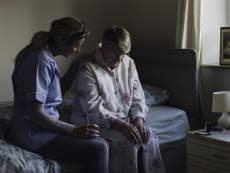Post-Brexit immigration system risks ‘alarming’ shortfall in care staff, NHS leaders warn
‘Very severe concern’ over difficulty of getting visas for care workers, says NHS Confederation

Your support helps us to tell the story
From reproductive rights to climate change to Big Tech, The Independent is on the ground when the story is developing. Whether it's investigating the financials of Elon Musk's pro-Trump PAC or producing our latest documentary, 'The A Word', which shines a light on the American women fighting for reproductive rights, we know how important it is to parse out the facts from the messaging.
At such a critical moment in US history, we need reporters on the ground. Your donation allows us to keep sending journalists to speak to both sides of the story.
The Independent is trusted by Americans across the entire political spectrum. And unlike many other quality news outlets, we choose not to lock Americans out of our reporting and analysis with paywalls. We believe quality journalism should be available to everyone, paid for by those who can afford it.
Your support makes all the difference.Priti Patel’s post-Brexit points-based immigration system risks creating an “alarming” shortfall in social care workers in the coming years, NHS leaders have warned.
The NHS Confederation, which represents health organisations in England, Wales and Northern Ireland, appealed for ministers to show “flexibility and pragmatism” on the new system to avoid blocking the flow of care workers from abroad needed to keep the system staffed.
The Confederation’s senior European policy manager Kate Ling told a parliamentary inquiry that there were 112,000 vacancies to be filled at any given time in the care system and “really severe concern” that the new immigration rules will make matters worse, with a knock-on impact on the NHS as it becomes more difficult to discharge patients to care homes.
Care workers from Europe and elsewhere in the world are “very unlikely” to qualify for visas under the system in force since the transition to Brexit ended freedom of movement for EU nationals on 1 January, which awards points based on salary and qualifications, Ms Ling told a House of Lords EU committee.
“The health and social care sector in the UK suffers from an enormous shortage and unless there's very significant additional recruitment and retention. the situation is pretty alarming,” said Ms Ling.
The government’s target of recruiting an additional 50,000 NHS nurses in England over the next five years will rely heavily on inward migration, but nearly all healthcare workers will qualify for a visa on the basis of their profession, benefitting from fast-track entry, reduced fees and exemption from the immigration health surcharge, she told the committee.
But she said that it was “a really different story” for social care workers.
“Frontline care workers do not qualify under the new points-based immigration system, they don't qualify for visas to enter the UK because they don't earn enough and they don't have high enough qualifications,” said Ms Ling.
“There is really severe concern over the impact of the new system and the knock-on pressures on the NHS.
“There's no difference for people whether they're coming from the EEA (European Economic Area) or wider afield. Either way, they would be very unlikely to qualify for visas under the new system. So the only way to make up that shortfall is from the domestic workforce.”
Ms Ling issued a plea to ministers: “The government has said that they will review the impact of ending freedom of movement on the social care sector.
"I would urge them not only to review the situation but to have the boldness and the wisdom - or perhaps we should say the flexibility and the pragmatism - to come forward with solutions.
“That could involve flexibility and discretion and making changes, possibly, to the immigration system.”




Join our commenting forum
Join thought-provoking conversations, follow other Independent readers and see their replies
Comments